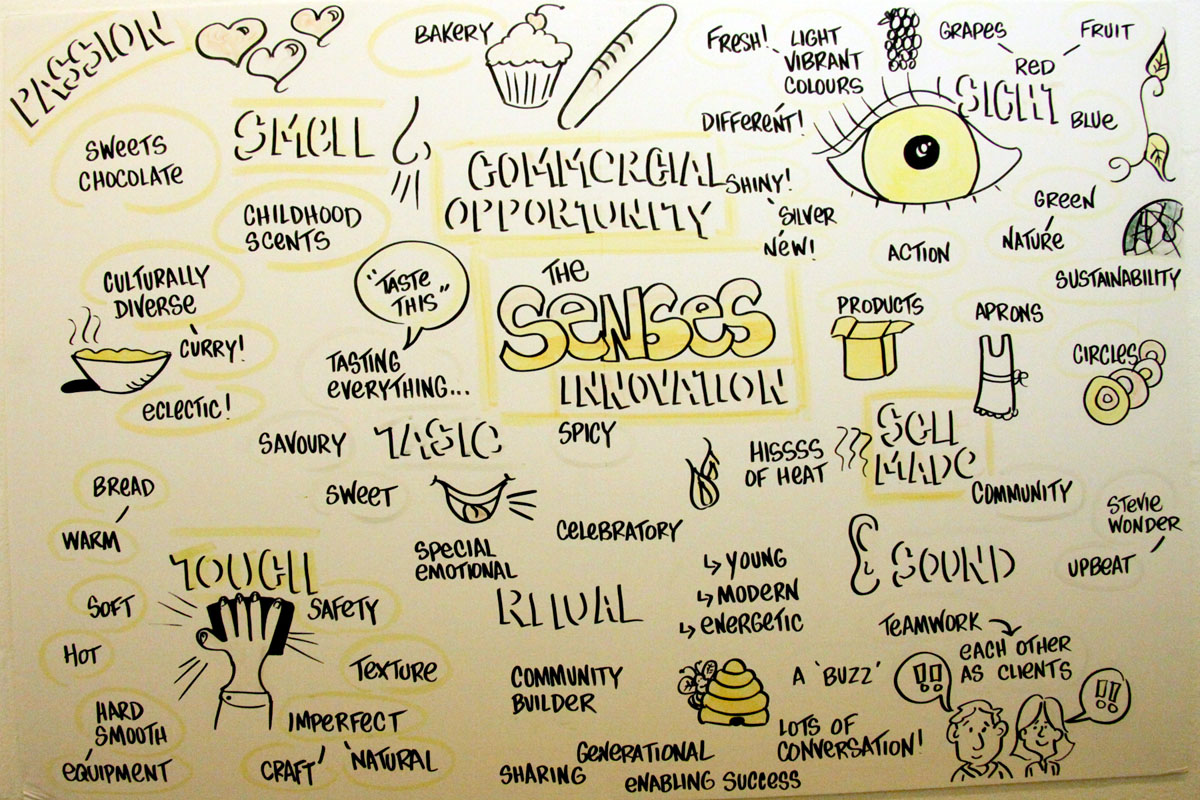From Family Recipes to Cricket Sauces
A pinch of this and a dash of that — it’s hardly a recipe, but it’s exactly what Simi Kular’s mother gave her when she asked for some of her Indian recipes when she was moving from the family home.
“She did everything without a recipe,” says Simi, co-founder of Jaswant’s Kitchen, a spice company named after her mother, Jaswant.
Jaswant (who now goes by the name Jessie) understandably had a mother’s desire to have her children learn traditional Indian dishes — dishes she admits are time-consuming and can be complicated to make because of the number of steps and spices involved.
Concerned about her own culinary traditions being lost, she came developed spice blends for both her daughters to take with them when they left the family home. One such blend, which Simi lovingly calls the “magic blend,” is a mix of 17 to 20 ingredients that can save an Indian dish, such as chana masala or aloo gobi, but better yet, it simplifies the entire cooking process.
Jessie explains that her spice blend was inspired by the summers she spent at her grandmother’s house on the Indian countryside.
“I would sit there with a mortar and pestle and grind the spices every single day,” she recalls, adding that by the end of every summer, she had the spice combinations and amounts memorized, even as a young child. She channelled those memories to make the original spice mix for her daughters and those same memories helped spawn what has turned into a commercial line of more than a dozen spice blends and products.
But launching a business takes more than a mother’s “magic blend.” It requires in-depth knowledge of food safety, production lines, marketing and distribution — knowledge the Kulars simply didn’t have, even though Jessie had a master’s degree in food and nutrition from the Punjab Agricultural University in India.
When the spice blends became popular among friends, family and at farmers’ markets, the banquet hall kitchen they had been working out of after hours just wasn’t cutting it anymore. Enter Food Starter — a non-profit food incubator dedicated to helping would-be food entrepreneurs turn their gastronomic ideas into viable businesses. The organization is funded by all three levels of government, including the City of Toronto, and provides space, guidance and expertise to fledgling food companies at a fraction the price of commercial rental and consulting rates.
Food Starter rented a 200-square-foot space to the Kulars, one that is now pleasantly punctuated by the smell of turmeric, coriander and caraway seeds. Under the Food Starter model, rented “accelerator spaces,” such as the one the Kulars have, are given to companies that have a good handle on their production and can use their own equipment, while also leveraging the shared resources of the Food Starter facility, according to Dana McCauley, Food Starter’s executive director.
An added advantage to renting the space at an affordable rate is the fact that the incubator prides itself on health and safety — meaning burgeoning businesses don’t have to worry about pest control or fridge temperatures, allowing them to focus on their product.
The Kulars know the location won’t be their forever home, something McCauley also makes clear.
“We have to enforce them meeting their milestones,” says McCauley, whose background in food-product development was a perfect match to take on the executive role about two years ago, when the incubator formally launched in its 20,000-square-foot space in North York.
She likens her role to that of a mother with adult children. She wants her “children” — the incubating businesses — to get out and succeed in the world. To that end, every company that uses Food Starter must report back about its growth on a quarterly basis. McCauley says there’s almost always a waiting list for the accelerator spaces and the market-feasibility program, a 12-week primer designed to help early-stage entrepreneurs make a "go" or "no-go" decision to start a business.
The idea of the food incubator space first surfaced 10 years ago when Michael Wolfson, the city of Toronto’s food and beverage sector specialist, came up with it. McCauley, clearly still inspired by the idea, calls Wolfson “pretty guerrilla” for his time.
Food Starter’s first iteration started in 2007 in an old Italian café, until additional city funding allowed for a more permanent solution to open in North York in 2015.
The kitchens at Food Starter are like blank canvasses for food entrepreneurs — they can even come with a production assistant to walk newcomers through specialty equipment, something particularly enticing for innovators who have great ideas, but little to no knowledge of food manufacturing.
Esther Jiang, CEO and co-founder of Gryllies, a company that makes tomato sauce using cricket protein, was one such innovator. Jiang and a team of students at Queen’s University came up with the idea behind Gryllies during an internship that focused on improving the planet’s food sustainability system. They came across a World Health Organization article that urged people to consider insect protein for nutrition, an idea that piqued their interest and led the team to further research the environmental and nutritional impact of crickets.
They soon learned that one of the largest international cricket suppliers — Entomo Farms — is located in Ontario. The farm eventually became Gryllies’s supplier, too. Then came the challenge of figuring out how to make a product people would consider eating, Jiang says.
When the team realized it needed help with regulations, manufacturing, food safety, supply chains, merchandising and production, it reached out to Food Starter, on organization former professors had recommended.
Gryllies — a moniker Jiang devised from gryllodes sigillatus, more commonly known as the tropical house cricket or banded cricket — was approved for Food Starter’s food commercialization program in late 2016. Today, Jiang remains the only one involved from the original team and her pitch sounds almost too good to be true.
“To produce one pound of protein from cricket, it takes one gallon of water,” she says. “One pound of beef needs 2,000 gallons of water.” Even tofu requires more than 300 gallons of water to produce one pound.
As for the crickets themselves? “They’re in cricket condos, you stack them vertically, so they don’t take up a lot of space,” she says, adding that crickets can feed off bio scraps, including corn husks and peels — things humans don’t typically eat.
“The entire ecosystem is very effective,” she asserts, a fact that aligns with her original mission to contribute to a “food solution” for the world’s growing population.
A side-effect of starting a food business with a great idea, but knowing nothing about the sector, is learning from your mistakes. Jiang remembers the first batch of sauce she made didn’t quite set properly, causing the jars to pop. She’s since perfected the packaging and processing and her sauce is currently being carried by Loblaws at Maple Leaf Gardens, in addition to various smaller local markets and online.
One challenge she still has to overcome is the consumer’s “ick factor,” which she says can be solved with better education. “For some people, it’s just too much of a mental barrier to get over,” she says with a laugh. “But surprisingly, we’ve had a positive response once people realize it's an irrational fear, especially when they compare it to what we currently eat.”
Crickets have actually been a common commodity at Food Starter in recent years. McCauley recalls at one point having four startups using crickets in their products — everything from baked goods to savoury sauces such as Gryllies.
But the goal with food entrepreneurship is being at the front end of trends, even before they become trends, McCauley says. That’s because small startups won’t be able to compete with bigger first-to-market competitors.
A trend is exactly what inspired Ted Fleming’s business, but it’s one in which he couldn’t partake. Just when he started getting interested in Toronto’s booming craft-beer industry, he received the life-changing diagnosis of Crohn’s disease that forced him to abandon alcohol.
Fleming changed gears and now has as his mission to see nonalcoholic beers move from the dusty bottom shelves of grocery store aisles to centre stage and beyond. Indeed, he hopes to bring them to the forefront of craft-beer sections, by opening what he believes is North America’s only craft brewery solely dedicated to non-alcoholic suds.
“I missed the taste of beer and discovering all the awesome new craft beers,” he explains. “I missed the social connection that comes from sharing a drink with a colleague after work.” After experimenting with what was available on the market, which Fleming describes as “just awful,” with no variety, he took matters into his own hands. First, he opened an online store that curated non-alcoholic beers from all over the world, and now, he brews his own, aptly named Partake.
“Non-alcoholic beer drinkers want to partake in the craft-beer journey with everyone else… because fundamentally, we’re beer lovers too,” he explains.
For Fleming, Food Starter provided professional advice, connections to others in the food and beer business and a community of other food innovators.
“It’s a great place for entrepreneurs to connect and help each other solve problems, share knowledge and collaborate,” he says of the incubator.
It’s a sentiment echoed by Simi Kular, who says connecting with others in the industry is a key advantage to working with Food Starter. She laughs that the space even comes with built-in market testers… especially when someone is making baked goods and the sweet smells overwhelm the large space.
For Jiang, the non-profit’s biggest asset is the help it provides to navigate a very complex industry. “If it didn’t exist, the process would take 10 times as long and be 10 times as expensive,” she says. “There are so many intricacies you don’t know, you would fail. They lay a really nice foundation for everyone who has passion and drive in the food industry — and it helps level out the playing field.”
That said, the key to entrepreneurial success is grit and tenacity.
“We’re always solving puzzles here — there’s no day that doesn’t require creative thinking and problem-solving,” McCauley says. “When you see a company go from just a couple of farmers’ markets to being on Amazon and then Whole Foods, you feel proud.”
Food Starter
76 Densley Ave., Toronto, Ont.
foodstarter.ca, 416.249.9500
Jaswant’s Kitchen products are for sale at dozens of fine food markets in Toronto, including Fiesta Farms and McEwan. jaswantskitchen.com
Gryllies is for sale online, at Karma Food Co-operative, Summerhill Market and the Maple Leaf Gardens Loblaws. gryllies.com
Partake beer is available online at Premium Near Beer and at various restaurants, including 3030 Dundas West, Miku Toronto and 360 The Restaurant at the CN Tower. drinkpartake.com












